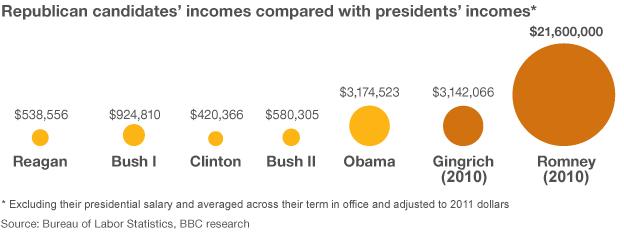US Republican hopeful Mitt Romney pays 13.9% tax
- Published
- comments
Mitt Romney and Newt Gingrich tussled over integrity on Monday night's NBC debate in Florida
US Republican presidential candidate Mitt Romney expects to pay about $6.2m (£4m) in taxes on income of $42.5m in the last two years.
That makes for a tax rate of 13.9% in 2010, external and an expected rate of 15.4% in 2011, external, his campaign said.
His income places him among the top earners in the US, and his tax history has become a campaign issue.
Mr Romney was an early favourite in state primaries but lost the latest, in South Carolina, to rival Newt Gingrich.
Mr Gingrich released his tax figures on Saturday, saying he paid nearly $1m last year, a rate of about 31%, external.
On the same day he won a striking victory in the South Carolina vote, beating Mr Romney with more 40% of the vote.
President Barack Obama is expected to highlight economic inequality in his annual State of the Union address later on Tuesday.
'Not a dollar more'
Mr Romney is a multi-millionaire businessman and former Massachusetts governor with three homes.
He lives mainly on income derived from his investments, for which only 15% tax is payable. Earned income is taxed at up to 35%.
On Monday, before he released his income and tax figures, Mr Romney defended his tax record at a Republican presidential debate in Florida.
"I pay all the taxes that are legally required and not a dollar more. I don't think you want someone as the candidate for president who pays more taxes than he owes," Mr Romney said.
On Tuesday, Mr Romney's campaign released his 2010 tax papers and estimates for his 2011 taxes, for which he has not yet filed a return.
He and his wife Ann reported income of $21.6m in 2010 and $20.9m last year, almost all it from investments. There were no declared wages on the 2011 estimate.
They gave $7m to charity in the same period, about half of it to the Mormon Church.
President Barack Obama and his wife Michelle released their 2010 tax return, external in April last year, showing an income of $1.7m. They paid about $450,000 in federal tax, a rate of about 26%.
Tax debate
Mr Romney had promised to release the figures, saying the question of tax had become a distraction for his campaign, and he wanted to re-focus on the main issues.
However, he had initially refused to release the returns, saying the financial disclosure reports that all federal candidates must provide should be enough.
But the reluctance allowed his Republican rivals and Democratic critics to focus on his record at private equity firm Bain capital, painting him as a wealthy businessman who cut jobs and shut down firms.
Mr Romney's supporters have leapt to his defence, equating attacks on his business practices with criticism of American capitalism itself.
But the issue has reignited the debate in the US over how investment income - in particular carried interest, the profits that private equity managers make - is taxed.
President Obama has said such income should be taxed at a higher rate, and that wealthy Americans and corporations should pay more tax to help trim the country's deficit.
Republicans are opposed to any tax hikes, saying they would harm the economy.
Gingrich surge
Mr Romney had led the Republican field since November and appeared to have won the first two contests of the campaign, in Iowa and New Hampshire.
But the Iowa caucus result was overturned in a recount which gave a narrow victory to Rick Santorum.
Mr Gingrich, who polled poorly in both Iowa and New Hampshire, won a convincing victory over Mr Romney in South Carolina after attacking Mr Romney over his business and tax records.
Mr Romney has called on Mr Gingrich to release documents related to his involvement with mortgage giant Freddie Mac.
Freddie Mac, a federally backed mortgage guarantor, required millions in government aid after in 2008 financial crisis.
In latest debate, Mr Romney said Mr Gingrich was doing business with Washington's "chief lobbyists".
Mr Gingrich said he served as a historian and consultant for the company, not a lobbyist.
Earlier on Monday, Mr Gingrich released his 2006 contract with Freddie Mac, external, but the document did not cover most of his multiple-year working relationship with the company.
The candidates are now campaigning in Florida, which holds its primary on 31 January. The state is seen as a major battleground in the US general election, with a diverse electorate and and a cash-hungry advertising market.
Primaries and caucuses will be held in every US state over the next few months to pick a Republican nominee to take on Democratic President Barack Obama in November.
The eventual winner will be anointed at the party convention in August.
